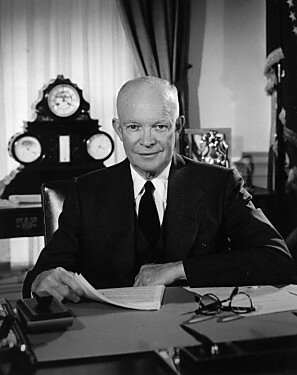[caption align=right]
Dwight D. Eisenhower[/caption]
The Secretary of Defense gave a good speech over the weekend at the Eisenhower library. Gates used the occasion to evoke Eisenhower and call for discipline in defense spending. But he didn’t really mean it.
The speech makes excellent points about how our military’s size long ago ceased to have anything to do with our potential enemies. He pointed out that the non-war defense budget has grown by about half since September 11 and that country’s current fiscal circumstance means that that growth has got to slow.
But the speech shows no indication that Gates wants to cut defense spending. It isn’t even clear that he has changed his view that defense spending should grow by about 2% annually no matter what happens in the world. He claims that while defense secretary he has canceled programs worth $330 billion in their lifetime. True, but they were replaced by other programs, and the budgets Gates has sent to the Hill have been bigger each year in real terms. A cynical take is that Gates is trying to preempt calls for defense cuts by acting as if roughly flat budgets require great discipline.
What’s really going on here is that the cost of the current defense program is growing so fast that you need large annual increases just to keep what you have. The main cause is rapid growth in the cost of operations and maintenance and personnel. Those accounts are squeezing others (research, development and procurement) needed for new vehicles and weapons. Last year, Gates responded to that pressure by proposing cuts in procurement spending. People treated him like a revolutionary for doing so, but he was just balancing his books. Now that the worst white elephant programs are gone (with several glaring exceptions), Gates is pushing the services to cut overhead costs and shift the saving into procurement. And he is telling them to buy more cheap platforms by controlling requirements creep. Same price, better product. End of story.
The point Gates missed about Eisenhower is that he used strategy to limit spending. The New Look was an air force-first strategy that limited army and navy spending, much to the chagrin of those services. Gates’ enthusiasm for counter-insurgency wars has not lead him to propose cutting the navy and air force budgets to fund the super-sized ground forces one needs for such missions. His official strategy shows little inclination for hard choices.
Real reductions in military spending require reductions in the ambitions it serves. A cheaper military means doing less. This administration has shown no interest in that. Maybe the fiscal situation will force them to reconsider.

